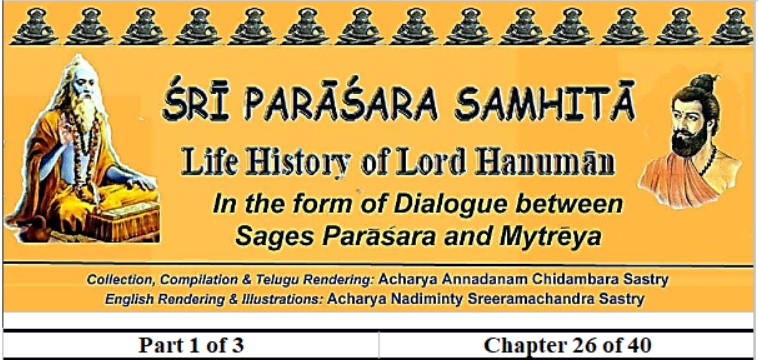
26th Chapter (Śadvimśatitamah Paţalah)
“Explanation of the Orderly Enlivenment of Hanumanmantra”
(Hanumatmantra puraścaraņa Vivaraņamm)
श्रीपराशर:
श्लोक:
यस्तृणीकतृब्रह्मास्त्रसारस्सर्वसुरार्चित:
शौर्यसर्वंकषप्रज्ञस्तं वन्दे वायुनन्दनम्।। 1
Seer Parāśara:
“I bow to such Son of the Wind God (Vayunandana), the One who treats the great Brahmastra missile like a blade of grass, One who is worshipped by all the Gods, One who can win everything by His valour. (1)
ईश्वर उवाच
अर्थातस्संप्रवक्ष्यामि पुरश्चर्याक्रमं प्रिये!
त्रूणुष्वैकाग्रचित्तेन गोप्यं लोकोपकारकम्। 2
I am narrating the procedure of the Orderly Enlivenment (puraścaraņa) after telling the methodology of Hanumanmantra so that its achievement (siddhi) can be obtained. Pārvatī! Listent to this that is most secret and most beneficial to all the people. (2)
पुरश्चर्याविधानेन विना मन्त्रं न सिध्यति
तस्मात् कार्या पुरश्चर्या देशकालादिमन्त्रत:
पुरश्चर्या विधीयन्ते त्रूणु वत्स शुभप्रदम्।। 3
Without the Orderly Enlivenment procedure, the mantra will not fructify. So one should attempt Orderly Enlivenment as per the concerned time and place. Oh! Mytrēya! Listen to the method of Orderly Enlivenment. (3)Without the Orderly Enlivenment procedure, the mantra will not fructify. So one should attempt Orderly Enlivenment as per the concerned time and place. Oh! Mytrēya! Listen to the method of Orderly Enlivenment. (3)
मूढादिसंयुतं कालं परित्यज्य दृढव्रत:
परिशुद्धश्शुद्धकाले स्वस्थचित्तो जितेन्द्रिय:।। 4
When to Perform – Seasons?
Leaving the periodical inauspicious periods of the planets Juptar (Gurumoudhya) and Venus (Śukraoudhya), during an auspicious period, a greatly determined, pure person with eligible inner consiousness and control over organs of sense, (4)
आलोक्य शुद्धकालादीन् पुरश्चर्यामुपक्रमेत्। 5
After considering the auspicious time and others, has to start the Orderly Enlivenment procedure. (5)
ग्रीष्मकाले तु सन्तापे वर्षाकालांबुमध्यमे
शीतकाले·प्यटव्यां तु तत्र सिद्धिर्भवेन्नृणाम्।। 6
People can obtain fructification of the mantra if Orderly Enlivenment procedure is carried out in burning sunshine during the summer, in the middle of water during the rainy season and right in the forest during the winter. (6)
ग्रीष्मकाले तु मध्याह्ने वर्षाकाले द्विसंध्ययोरू
शीतकाले प्यर्धरात्रिरू जापकस्येष्टसिद्धिदा।। 7
The Orderly Enlivenment procedure of the mantra will fulfill desired wishes, if carried out in the noon during the summer, early in the morning during the rainy season and at midnight during the winter. (7)
वसन्ते गहने रण्ये ग्रीष्मर्तौ पर्वतोपरि
वर्षायामूषरक्षेत्रे शरत्पुलिनमध्यमे।। 8
It is best to perform it inside unbearable caves during the spring, on the top of a hill during the summer, on barren land during the rainy season and on sand dunes during the autumn season. (8)
हेमन्ते सलिले मध्ये शैशिरे सिकतास्थले
ऋतुष्वेवं फलं ज्ञात्वा प्रयत्नेन जपेत्सुधीरू।। 9
Knowing the nature of each season well, one has to perform it on purpose, in the middle of water during the winter, on sand dunes during the chilly season, so on. (9)
चैत्रमासे र्थहानिस्स्यात् व्याधिना पीडितो भवेत्
वैशाखे भूमिलाभस्स्यात् जयेष्ठे तु मरणं विदुरू।। 10
When to Perform – Months?
If the Orderly Enlivenment is performed in the 1st Lunar month (Chaitra), one would loose wealth or troubled by disease. If performed in the 2nd Lunar month (Vaiśākha), one would earn land property. If performed in the 3rd Lunar month (Jyēşţa), death could occur. (10)
बन्धुनाशनमाषाढे नभस्यायुष्करं भवेत्
पुत्रहानिर्भाद्रपदे स्यादाश्विने न वृद्धिकृत्।। 11
One may lose a relative, if performed in the 4th Lunar month (Aşādha). The 5th Lunar month (Śrāvaņa) is life prolonging, The 6th Lunar month (Bhādrapada) causes danger to the son. The 7th Lunar month (Aśvin) does not give progress. (11)
कार्तिके वश्यमाकर्षं मार्गशीर्षे शुभावहम्
स्थाननाशाश्च पौष्ये च माघमासो र्थलाभदरू।। 12
The 8th Lunar month (Kārtīka) gives achievement of control over others and attraction power. The 9th Lunar month (Mārgaśirşa) is very auspicious. The 10th Lunar month (Puşya) causes decay of the place. The 11th Lunar month (Māgha) causes gain in wealth. (12)
फाल्गुने पत्निहानिश्च एवं मासफलं विदुरू 13
The 12th Lunar month (Phālguņa) causes harm to the wife. Thus the nature-outcome of different months must be known. (13)
सौम्येष्टकार्यंसिद्ध्यर्थं प्रजपेदुत्तरायणे
मरणाद्युग्रकायार्थं प्रजपेद्द्क्षिणायने।। 14
For success in pleasant and desired acts, it has to be performed when the Sun is in the northern- hemisphere (uttarāyaņa). Ferocious acts like killing some one has to be done when the Sun is in the southern-hemisphere (dakşnāyanņa). (14)
स्तम्भनं चैव हेमन्ते शैशिरे मारणं विदुरू
आकर्षणं वसन्ते स्यात् ग्रीष्मे विद्वेषणं विदुरू।। 15
The Orderly Enlivenment has to be performed in the winter for freezing other’s powers, in the autumn for death of some one, in the spring for attraction, in the summer for enemity.(15)
उच्चाटनं स्याद्वर्षर्तौ वश्यं च शरदि स्मृतम्
जपेयुरू सर्वमन्त्रांश्च सर्वर्तुषु मुमुक्षवरू।। 16
The rainy season is the best for driving away spirits and ghosts and the autumn – for achieving control (vaśīkaraņa) over others. If liberation is desired, all the mantras can be recited in all the seasons. (16)
एवं ऋतुफलं ज्ञात्वा ज्ञेयं दिनफलं ततरू
प्रतिपद्विघ्नकारी स्यात् द्वितीया भीष्टदायिका।। 17
Thus, one has to know the fruits of each season and fruits of each date (tithi). (17)
तृतीया विजयप्राप्ति: चतुर्थी फलहानिकृत्
पव्म्चम्यामिष्टसिद्धिस्स्यात् षष्ठी तूच्चाटनप्रदा।। 18
When to Perform – Days?
Performing the Orderly Enlivenment on the 1st day of the fortnight (pādyami) causes obstacles, The 2nd day (vidiya) achieves the wishes. The 3nd day (tadiya) gives success. The 4th day (caviti) spoils the results. The 5th day (pańcami) fulfills the desired wishes. The 6th day (şaşţhi) is good for the control of wandering ghosts. (18)
सप्तमी कार्यकारी स्यात् अष्टम्यां मोहनं विदु:
विद्वेषणं नवम्यां तु दशमी वश्यकृत्परम्।। 19
The 7th day (saptami) causes success of the action. The 8th day (aşţami) causes a swoon. The 9th day (navami) brings in enmity. The 10th day (daśami) gives good control over others. (19)
एकादशी ज्ञानदा च द्वादशी त्वर्थकृत्परा
सर्वसिद्धिस्त्रयोदश्यां शत्रुवृद्धि: चतुर्दशी।। 20
The 11th day (ēkādaśi) is knowledgeful. The 12th day (dwādaśi) is very useful. The 13th day (trayōdaśi) is full of knowledge. The 14th day (caturdaśi) causes increase in number of enmies.(20)
आकर्षणं पौर्णमास्यां अमावश्यांतु मारणम्
उपरागादिसंक्रान्तौ पुष्करेषु यथा तथा।। 21
The 15th day causes achievement of attraction power if it is a full-moon day (poorņma) and death is possible, if it is a no-moon day (amāvāsya). The mantra invariably fructifies during eclipses, periods when the Sun moves from one Zodiac sign into another (sankrāntis), during the once-in-12 year auspicious river festivals (puşkaras; mēlas in Hindi). This the truth, the truth and the only truth. (21)
मंत्रसिद्धिर्भवेन्नूनं सत्यं सत्यं मयेरितम्
सूर्योदयं समारभ्य घटिकादशकं क्रमात्।। 22
When to Perform –Time?
The most appropriate time is from the sunrise to 10 ghaţias (10 x 28 minutes = 6 hours and 40 minutes). (22)
वसन्तग्रीष्मवर्षर्तु शरद्धेमन्तशैशिरा:
पुरश्चर्योपदेशानां योगेषु शिवरात्रिषु।। 23
Also appropriate are the spring, summer, rainy, autumn, winter and pleasantly cold (between winter and spring) seasons; it is auspicious whenever a person capable of imparting Orderly Enlivenment procedure is available; on the Śivarātri (Śiva’s day). (23)
न तिथिर्न च नक्षत्रं न मासो ना पि पार्वणं
न मंत्र: शुभद: प्रोक्त: स्वयमाहूय दीयते।। 24
It was told that it gives auspiciousness without restraining rules in any day (tithi) or star constellation (nakştra) or month (māsa) or festival day (arvaņa), if the Guru himself comes and imparts at his free will. (24)
एवं दिनफलं ज्ञात्वा ज्ञेयं वारफलं तत:
मन्त्रस्यारम्भणे भानुवासरो वश्यकृत्पर:।। 25
When to Perform – Days of Week?
Thus one has to first know the significance (results) of the day of the week and then that of the week. Sunday is amenable for beginning the mantra in acquiring control over others. (25)
इन्दुवारे तु मोक्षस्स्यात् भौमे मारणमुच्यते
स्तंभनं सौम्यवारे स्यात् गुरौ चाकर्षणं विदु:।। 26
Monday is amenable for obtaining salvation (mokşa). Tuesday is considered to be inimical. Wednesday helps in stalling other powers. Thursday is ideal for acquiring the power of attraction. (26)
विद्वेषणं भृगोर्वारे स्तम्भनं रविनन्दने
एवं वारफलं ज्ञात्वा ज्ञेयं कालफलं तत:।। 27
Friday is important for separating people or show dislike. Saturday recitation can cause freezing activity (sthambhana). Thus, after knowing the significance of the days, significance of time periods (kālaphalam) have to be known. (27)
उदयाद् यामपर्यन्तं हेमन्ते स्तम्भने जपेत्
शैशिरे प्यस्तमानादि द्वियामे मारणे जपेत्।। 28
When to Perform – Time-Periods of the Day?
The power freezing activity (sthambhanaśakti) can be obtained by reciting till three hours (71/2 ghaţia = 1 yāma) post sunrise during winter. For killing power (māranņaśakti) recitation has to be done withing 15 ghaţia (6 hours) post sunset. (28)
द्वियामाद्यन्तमाकर्षे वसन्ते प्रजपेत्सुधी:
तृतीयप्रहरे ग्रीष्मे जपेद्विद्वेषकर्मणा।। 29
It has to be performed for two yāma (3 hours @ 4 per day and night) from beginning to end during spring for acquiring attraction (ākarşaņa) power. It has to be performed in the third yāma (around mid-day) during summer for the act of separation (vidvēşaņakarma). (29)
वर्षागमे चतुर्यामे जपेदुच्चाटनं बुध:
अर्धरात्रौ शरत्काले प्रजपेद्वश्यकर्मणि। 30
It has to be performed in the 4th yāma (for 3 hours after mid-day) during the summer for destruction (ucchāţana). It has to be performed around mid-night during autumn for obtaining controlling (vaśīkaraņa) power over others. (30)
मध्याह्ने सर्व तुषु मोक्षार्थी प्रियतो जपेत् 31
One desirous of attaining liberation from the mundane world can perform this with devotion in any season in the afternoon period. (31)
नंदा भानुसुतोपेता स्तम्भने तिप्रशश्यते
भदे्रन्दु: गुरुणायुक्त्ं वश्यकर्मणि शश्यते।। 32
Auspecious & Inauspecious Days
There are three nandatithi (auspicious days), namely the 1st, the 6th and the 11th. These are best for stalling (sthambhana), if they fall on a Saturday. Similarly, the so called bhadratithi (safe and prosperous days), namely, 2nd, 7th and 12th falling on Monday and Thursday, that are best for acquiring powers of controlling others (vaśyakarma). (32)
जया भृगृसुतोपेता प्रशस्तकर्मणीरिता
रिक्ता भूमिसुतोपेता शस्ता मारणकर्मणि।। 33
The three jayatithi (auspicious days), namely the 3rd, the 8th and the 13th days falling on Friday are very beneficial for the act. The 4th, the 9th and the 14th are the ‘empty days (riktatithi) that are good for death acts (māraņakarma).(33)
पूर्णा सोमबुधोपेता प्रशस्ता शुभकर्मणि 34
The 5h, the 10th and the 15th-full-moon days are ‘full days’ (poorņatithi) best for auspicious deeds (subhakarma), if they fall on a Monday and Wednesday.(34)
दुष्टतिथ्यृक्षवारेषु मारणोच्चाटनादय:
मन्त्राड्ष्मेषु सर्वेषु प्रशस्तं शड्करोदितम्।। 35
Inauspecious day (in a fortnight), star constellation and day of the week are told by Śankara to be good only for death and destruction acts.(35)
सौम्यक्र्षतिथिवारेषु सौम्यकर्म प्रशस्यत
सिध्यन्ति सर्वकार्याणि संक्रांतिग्रहणादिषु।।
संशोध्यैवं प्रकुर्वीत मांत्रिकास्तत्त्ववेदिन:।। 36
Auspecious day (in a fortnight), star constellation and day of the week are told to be best for good acts. All acts fructify during movement of Sun from one Zodiac sign into another (sankrānti) and eclipse periods. Knowledgeable ritualists perform Orderly Enlivenment only after first investigating these (time, day, month etc) aspects.(36)
पूर्वाह्णे वश्यपुष्टयर्थं मध्याह्ने स्तम्भने जपेत्
मोक्षे शांतौ चार्धरात्रौ तदुध्र्वं सर्वकर्मणि।। 37
Perform in the forenoon for acquiring control over others (vaśīkaraņa) and strength (pusti), in the after-noon for stalling (stambhana), at mid-night for liberation (mokşa) and peace. Beyond these times it can be performed for other achievements/actions.(37)
एवं कालफलं ज्ञात्वा तत: कल्पोäमार्गवत्
अनुक्तकालाधुक्तस्यात् पुण्यकाले समागते।। 38
Thus, knowing the virtues of the time first, if performed as close as possible to the route described in the science of rituals, the Orderly Enlivenment; if the period is auspicious, even undesirable time becomes useful.(38)
पुरश्चर्योपदेशादौ मान्त्रिको वर्णपूर्वकम्
सर्वानेतान्विदित्वाथ स्थलं ज्ञात्वा समाहित:।। 39
Auspecious & Inauspecious Locations
Before imparting the Orderly Enlivenment procedure, the teacher (sorcerer Guru) has to know well the procedure as per the protocol of imparting the precise methods, know the precise location and be well prepared,(39)
शिवालये नदीतीरे पर्वताग्रे जलाशये
गोगृहे तुलसीबिल्बसमीपे शक्तिमन्दिरे।। 40
In a Śiva temple, on the bank of a river or lake, at the top of a hill, inside a cowshed or in a Holy Basil (tulaśi) garden, near a wood-apple (bilva) tree, in the temple of Mother Goddess,(40)
श्मशाने चान्तरिक्षे च पाताले च गवांगणे
पुरग्राममहातीर्थे सागरे सिन्धुसंगमे।। 41
In a burial ground, in the sky (open), in the under-world (pātāla) amidst a group of cows, in the city, in a village, at a well-known piligrim centre, in the seas, at a place where the river joins the sea (Note: ‘inside the house courtyard’, as per another version),(41)
विष्ण्वालये महोद्याने स्वगृहे विजने पि च
सिद्धसाध्य सुसिद्धारीन् संशोध्य विधिवत्पुन:।। 42
In a Vişnņu temple, in side vast parks-gardens, in one’s own house or in a forest; having first examining whether the (square) place is achieving one (siddhakōşţha) or attainable one (sāddhyakōşţha) or ready-to-use (achieving well) one (susiddhakōşţha) or anti-result (enemy; arikōşţha),(42)
कूर्मचक्रानुसारेण गुहायां विजनस्थले
शुद्धे स्वाभिमते रम्ये निर्बाधे निरुपद्रवे।। 43
As per the Great-Turtile amulet (Kūrmacakrānusārēņa) in a cave, in sparcely populated location, at a clean place, at a desired place, at a pleasant place and at a place where there are no difficulties or dangers,(43)
स्थित्वाथ दोषरहिते शुक्लपक्षे शुभे दिने
चन्द्रताराबलोपेते विध्युक्तं स्नानमाचरेत्।। 44
Pre-Ritual Bath
At a blemishless place, one has to take bath as stipulated and when the power of the star and moon (on the day) is good (for the performer).(44)
भौमं वारुणमाग्नेयं वायव्यं दिव्यमेव च
कापिलं मात्रमाकाशं नवनीतं च मानसं
एते दशविधास्स्नाना: तेषु मानसमुत्तमम्।। 45
There are ten types of taking bath, namely bhouma (earth; mud!), vāruņa (water), āgnēya (fire), vāyuvya (wind), divya (divine), kapila (celestial), mātra (limited), ākāśa (sky; open!) mānasa (according to mind) and navanįta (butter); out of which the mānasa bath is the best.(45)
तत्तत्कालोäविधिना तदुक्तं स्नानमाचरेत्
नद्यादिसलिलस्नानं अभ्यंगं तैरलंकृत:।। 46
One has to take head-bath (abhyangasnāna) in the above manner as instructed from time to time or in water of arrivers and come well dressed and ornamented.(46)
मन्त्रोदकेन संप्रोक्ष्य स्थलशुद्धिं विधाय च
माल्यवसनोपेत सुदर्शनमथोपरि।। 47
Starting the Procedure – the Seats
Having sanctified the place by sprinkling water, having arranged auspicious cloth, having meditated upon the discus of the Vişņu (sudarśana),(47)
ध्यात्वाथ स्वगुरुं क्षेत्रपालकं चैव संस्मरन्
ताभ्यामाज्ञापितस्तत्र संप्राथ्र्यैवाथ मेदिनीम्।। 48
Then remembering one’s Guru and the ruler of the place (kşētrapāla), and on their permission, bowing to the Earth,(48)
भूतापसर्पणं कुर्यात्तारा शक्त्यनलाक्षरै:
एवं कृत्वा तु विधिवत्सम्यगासनपूर्वकम्।। 49
And then perform the ‘driving the ghosts away (bhootōcchāţana). Thus seated on an appropriate seat, one has to perform as per procedure.(49)
तत्तदुक्तानुसारेण फलंत्वेवासनादय:
अनुक्तसनमासीन: प्रजपेन्मंत्रविन्मनुम्।। 50
Different seats give different results as told (by scholars). If the mantra is recited not in the seating postures told by the mantra scholars,(50)
तस्यायु: क्षीयते पत्नीहानिं विघ्नं च विंदति
तस्मादुक्तासनेष्वेव जपन्ते मन्त्रसाधका:।। 51
His longevity diminishes. Wife may be harmed causing an obstacle. Hence, the mantra recitation has to be performed in the recommended seats.(51)
अतोयासनभेदानि प्रपद्ये त्वं त्रूणुं प्रिये।। 52
Hence, Pārvatį! Listen. I am explaining the differences between the seats.(52)
चतुरस्र्ं दृढतरं समीचीनकृतं मृदु
हस्तमात्रमपि स्वच्छं तद् देवास्तरणं विदु:।। 53
A one-hand long square, strong, clean, soft and fresh seat is known as the god’s own bed (dēvāstaraņam).(53)
तादृगासनमासीनो जपेन्मंत्रमनन्यधी:
स्तम्भनोच्चाटने प्रोक्तं गोचर्मण्युष्ट्रचर्मणि।। 54
Seated on such an auspicious seat one has to perform with a calm and balanced mind. For stalling and destruction acts, performing while seated on a cow or camel hide is the best.(54)
अश्वचर्मणि विद्वेषं मारणं महिषाजिने
सौभाग्यमैणवं चर्म मोक्षश्री: व्याघ्रचर्मणि।। 55
The act has to be performed seated on a horse hide for avenging, on a buffalo bull hide for causing death, on a deer skin for auspicious life and on a tiger skin for salvation.(55)
ज्ञानं कुशासने सौम्ये मोक्षदं वसनासने
निष्फलं चासने दारो: यशोहानिस्तृणासने।। 56
Performing on a soft bed of auspicious full lengths of Kuśa grass (darbha) achievement of wisdom and – on a sheet of clothing, liberation. Nothing can be achieved by reciting seated on a wooden seat. Reciting seated on any grass serves no purpose.(56)
दु:खं क्षित्यासने प्रोक्तं रोगस्स्यादृषदासने
अजचर्मासने वश्यं आकर्ष: कम्बलासने।। 57
One gets sadness if one uses a seat of earth. Reciting seated on a stone causes disease, on a goat skin causes control over others, on a carpet creates attraction power.(57)
लभ्यन्ते सिद्धयस्सर्वा: चित्रकम्बलविष्टरे।। 58
On a diamond studded carpet – gives every sort of achievement.(58)
गजवानरभल्लूकबिडालशिवकृत्तिषु
मोक्षमारणविद्वेषव्याधिविद्रावणादिकान्।। 59
Reciting seated on an elephant skin – achiement of liberation, moneky skin – protection powers, bear skin – strong dislike, cat skin – disease and on a jackal skin – flight in fear.(59)
कुर्वन्ति श्वानमनुजखरकृत्तिषु मारणम्
विद्वेषे मारणे चोक्तं शवकेशकृतासने।। 60
Only power to cause death comes by sitting on the skins of dog, man or donkey. Sitting on a bed of one’s own hair is good for intense dislike and death causing acts. (60)
वस्त्रं कृष्णाजिनं चैव कुशासनमनुत्तमम्
बस्ताजिनं कम्बलं च व्याघ्रचर्म शुभावहम्।। 61
The best seats are those made of cloth, skin of black deer and of full strands of Kuśa grass. Skin of male goat, carpet and tiger skin are auspicious.(61)
ब्राह्मणोचितमित्याहु: कृष्णाधाजिन कुशासने
उक्तासने समासीन: प्रजपेन्मंत्रविन्मनुम्
वर्जयेदासनं मन्त्री दारिद्रयव्याधिदु:खदम्।। 62
Black deer skin and a bed of Kuśa grass plants are considered best for the Brahmin people. One performing the recitation must avoid seats causing poverty, disease or sadness. (See picture).(62)
वीरासने स्तंभनं स्यादुत्तानं मारणे विदु:
मारणस्तम्भनोच्चाटाद्युग्रकर्मसु सर्वत:
मांत्रिकैश्च प्रयोगज्ञै: कापालासनमुच्यते।। 63
Seating Postures & Gestures
Warrior posture (veerāsana) is good for stalling (stambhana) and forward bend posture (uttāaasana) – for causing death (māranņa). For the horrific acts like stalling, causing death and destruction have to be got done by a ritualist well versed with the concerned acts in headstand (kāpālāsana) posture (See picture).(63)
आसनानां फलं ज्ञात्वा सम्यगासनसंस्थित:
विकलीकृतचित्तस्थ: श्वसन् क्षुभितसंगत: 64
Even after knowing well the importance of the sitting/standing postures and remaining in the appropriate posture correctly, if one remains with a disturbed mind, irregular breathing or worried,(64)
अशुचिर्जनसंयुक्त: प्रलपन् भक्तिवर्जित:
कदापि न जपेन्मन्त्रं जपेद्यदि विनिष्फलम्।। 65
A unhygienic, talkative and faithless person should never recite this mantra. Doing so is waste. (65)
एवं विज्ञाय शास्त्रोक्तविधिनाच्छादितो व्रती
आच्छादनांबरं चालेपनं जपमालिका।। 66
Colours & Directions
Thus a person performing this ritual should prepare one self as prescribed in the scriptures. Upper clothing, applications on the body, a chanting rosary,(66)
तिलकं चासनं चैव हवनद्रव्यमेव च
तत्तत्फलानि दीयंते रक्तपीतसिता सितै:।। 67
Red dot on the forehead, seat and having red, yellow, white and black coloured items for the fire sacrifice, will give the respective results.(67)
रक्त्माकर्षणं प्रोक्तं शांतिमोक्षप्रदं सितम्।। 68
Red colour is for attraction power, white for peace and salvation.(68)
प्राड्मुखोदड्मुखो भूत्वा मोक्षार्थी जपमाचरेत्
प्राड्मुखो वश्यमित्याहु: मारणं यमदि³मुखे।। 69
One desirous of salvation must recite facing the East or North. East is ideal for obtaining control over others and South for causing death,(69)
व्याघ्रासने समासीन: प्राड्मुखोदड्मुखो पि वा
भस्मस्नानं तत: कृत्वा योगशास्त्रानुसारत:।। 70
One sitting on the skin of a tiger and facing East or North, applying ash over the body, performing as per scriptures,(70)
भूशुद्धिं भूतुद्धिं च गुरुवन्दनमेव च
हनुमन्मनुना कुर्यात् दशदिग्बन्धनं क्रमात्।। 71
Having reverentially bowed to the Guru, has to bind self (protectively; invisible) on all the sides using the Hanumanmantra. (71)
पापपुरुषस्य दहनमाप्लावनमत: परम्
कृत्वैकपिण्डीकरणमुक्तिमार्गाद्विचक्षण:।। 72
Performing ‘Nyasa’
Having cremated a sinful one, taken bath, one has to offer oblations (to the departed soul; pindīkaraņa), (72)
प्राणपतिष्ठां कृत्वाथ योगन्यासविधानत:
ऋषिच्छन्द:करो मन्त्रो मन्त्राद्यक्षरमंगुलि:
ह्रत्सर्वाड्ग व्यापकानि नवन्यासा: प्रकीर्तिता:।। 73
Then the ‘life-impartation’ (prāņapratişţţha) has to be performed. Then told are the nine touchings / gesticulstions – 1. Yōganyāsam (of Yōga), 2. Ŗşinyāsam (of the Sage), 3. Chandōnyāsam (of the metre), 4. Karanyāsam (of the hand hand), 5. Mantranyāsam (of the mantra hymn), 6. Mantrākşaranyāsam (of the Mantra letter), 7. Anguļįnyāsam (of the finger), 8. Hŗdayanyāsam (of the heart) and 9. Sarvāńganyāsam (of all the body parts). (73)
अन्तन्र्यासबहिन्र्यासौ हनुमन्न्यासपूर्वकम्
बन्धन्यासं च षट्ंत्रिशत् कलान्यासपुरस्सरम्।। 74
Similarly, antarnyāsam (done internally bahirnyāsam (done externally), srīhanumannyāsam (done for Hanumān), bandhanyāsam (done while bound), şaţtrinśatkaļānyāsam (done as per thr traditional 64 types of arts),(74)
उत्पत्तिस्थितिसंहारन्यासं कृत्वा समाहित:
सो हंभावनया तिष्ठेत् युक्तांगोपप्लवस्सुधी:।। 75
Utpattinyāsam (productive) sthitianyāsam (existancial) samhāranyāsam (finishing/cutting) – having performed such different nyāsas and and controlling the body parts still, one has to sit with a feeling that he/she himself/herself is the god. Thus one has to feel no difference between the soiul of self (ātma) and the Supreme Soul (paramātma), it seems. (75)
ध्याननिष्ठापर: पूर्वं मन्त्रोक्तन्यासपूर्वकम्
सम्यगेवंविधानेन सभ्म्यड्मन्त्रं विशोधयेत्।। 76
Mantra Purification (suddhi), Nature & Exclamations
As told in the mantra procedure, along with following the nyāsa procedures, after first immersed in meditation as per the told procedure, purification of the mantra (mantraśuddhi) has to be done. (76)
मृतस्सुप्तश्च मूकश्च नग्नश्शून्यो वृथाक्षर:
भुजड्गो वीर्यहीनश्च कीलितश्चे त्यमी नव
मन्त्रस्य दोषा: कथिता: तद्भिन्नभीष्टसिद्धिदा:।। 77
There are ten improprieties in mantra, namely, mŗitam (dead), suptam (in slumber), mookam (speechless), nagnam (naked), śūnyam (empty), vŗdhākşaram (with unnecessary letter), bhujangam (snake like), veeryaheenam (impotenet) and kiīitam (firmly fixed), which will not allow the desired achievement. (77)
शिरोहीनो मृत: प्रोक्त्: सुप्त स्र्यादासनं विना
विना न्यासेन मूकश्च नग्न: पल्लववर्जित: 78
Mŗitam is a headless mantra, suptam is a seatless one, mookam is without nyāsa, nagnam is one with out an exclamation – so called. (78)
शून्यश्च जपकाले तु त्रूणो त्यन्यस्य उच्यते
उपदेशेन रहितो हयुच्यते स वृथाक्षर:।। 79
Śūnyam is that heard while it is being explained to others with recitation, vŗdhākşaram is one that is not imparted by a Guru. (79)
त्यक्तछन्द: ऋषिर्मन्त्रो भुजड्ग: परिकीर्तित:
न्यूनाधिकाक्षरैर्युक्तो वीर्यहीनस्स उच्यते।। 80
Bhujangam is one without a metre and sage. Veeryaheenam is one with a letter more or less. (80)
कीलितश्चोद्यते मन्त्र अन्तरावाक्षरैर्युत:
इत्येवं सर्वमालोच्य ज्ञात्वा सम्यक्सुविस्तरम्
सर्वलक्षणसंयुक्तं गुरोर्मन्त्रं समाचरेत्।। 81
If the mantra is with the letters having interference or obstacle, it is told to be kiīitam. Knowing so many things and only after properly imparted by a good Guru, one has to follow the mantra procedure. (81)
नमोन्त: प्रणवान्तश्च शान्तिपुष्टिविवर्धनम्
स्वाहान्तस्सिद्धिदो भीष्टं वश्याकर्षणमोहने।। 82
A mantra with the words ‘namah’ and ‘ōmm’ at the end enhances peaceful personalities. A mantra with ‘swāhā’ at the end gives desired wish, controlling power over others, attraction power and sensual desire. (82)
पुष्ट्यादिसन्धको वौषट्पल्लवेन युतो मनु:
हुंकारपल्लवोपेत: विद्वेषे मारणे पि च। 83
A mantra with the exclamation ‘vauşaţ’ gives nourishment and other virtues. A mantra with the exclamation ‘hu-mm’ works for enemity and death. (83)
फडुच्चाटे वषड्वश्ये खे खे मारणकर्मणि
स्वाहा वाकर्षणे द्वेषे ह्रुं नमश्शान्तिहेतुक:।। 84
A mantra with the exclamation ‘phaţ’ causes destruction of wandering ghosts. It was told that exclamation ‘vaşaţ’ is for control over others, ‘khēkhē’ for causation of death, ‘swāhā’ for attraction and hatred purposes, ‘hu-mm; and ‘namah’ for peace. (84)
स्तम्भने ठठ इत्युक्त: मन्यौ सम्मोहने पि च
इत्यादिपल्लवोपेतो मन्त्रो जापकसिद्धिद:।। 85
Exclamation ‘ţţhaţţha’ is said to be for stalling, anger and stunning acts. Thus one can obtain the desired result by reciting mantras with the appropriate exclamation. (85)
‘खेखे’ पल्लवसंयुक्तो मन्त्रो सौ मारणे स्मृत:
भयविद्रावणे घोरे यन्त्रतन्त्र विदारणे
वर्षडंतो नम: प्रोक्त: ग्रहबाधानिवारक:।। 86
A mantra with the exclamation ‘khēkhē’ is used for causation of death. A mantra containing ‘namah’ and ending with ‘vaşaţ’ is said to be good for removing terrible fear, for breaking other mantra and yantra (amulet) and ill-effects of some planets,(86)
फडं तूच्चाटने चैव मंत्राष्षट्पल्लवान्विता:
पल्लवो स्त्यागमे मन्त्रे पल्लवो नास्ति वैदिके।। 87
‘Phaţ’ is said to be good for causing destruction. Mantras are inclusive of the six exclamtions (şaţpallavas). Exclamation (pallavam) is only in mantras of ritualism and not in the Vedic mantras.(87)
पल्लवेन विना मंत्रो जप्यो वेदसमुद्भ
नाप्युक्तो ब्रह्मणा पूर्वं वेदमन्त्रस्य पल्लव:।। 88
A mantra born in Veda should be recited without exclamations. Also, Brahma the Creator had not mentioned any exclamations for the Vedic mantras.(88)
पल्लवस्सर्वमन्त्राणां उत्तमाड्गं तदंशकम्
सपल्लवमनुस्सर्वकामद: परिकीर्तित:।। 89
The best part of all (ritualistic) mantras is the exclamation (pallavam). A mantra with an exclamation is said to fulfill all the desires. (89)
सम्यगेवं हि विज्ञाय मन्त्रकाले मनुं जपेत्
गाणेशो र्कोदयात्पूर्वं पूर्वाहो सौरवैष्णवा:।। 90
Recitation Timing and Counnt
For Manu, the originator of manuş (man) all the mantras have to be recited only in the defined time schedule. The Ganēşa (elephant headed God; remover of obstacles) mantra has to be recited before sunrise, sauramantra (for Son) and the Vişņu mantras – in the early part of the day’ (90)
र्निशीथे शाक्तिकेयास्स्यु: दिनान्ते शैवभैरवा:
सारस्वत्या: प्रभाते स्यु: सदा हनुमदादय:।। 91
Śakti (mother goddes) mantras at midnight, Śiva and bhairava (a form of Śiva) mantras in the evening, Saraswati (goddess of learning) mantras in the evening, every time for Hanumanmantras, are the ideal times for recitation. (91)
तदुक्तकालं विज्ञाय प्रजपेद्युक्तमालया
विंशत्यष्टोत्तरशतं तदर्ध् ता तदर्धकम्।। 92
Knowing the appropriate timing, using a counting rosary, one has to recite 128 times or a half of it or a quarter of it. (92)
उत्तमं जापकैर्युक्तं जपकालोक्तकर्मणि
अड्गु ष्ठागे्रेण यो मन्त्र जपेदड्गु लिपर्वसु।। 93
Experienced reciters told that, as per the indicated timings for different acts, one can recite best by counting on the knuckles (inside of) of fingers with the tip of the thumb. (93)
मंत्रड्गमहदस्योक्तं मोक्षं लोकवशंकरम्
अड्गुष्ठानामिकायोगे प्रजपेच्छांतिकर्मणि
मध्यमाड्गष्ठु योगेन जपेदाकर्षसिद्धये।। 94
Mantra Recitation Systems & Fruits
The greatness of mantra-usage was said to be good for achievement of salvation and control over others. (94)
अड्गु ष्ठतर्जनीयोगे विद्वेषोच्चाटने जपेत्
कनिष्ठाड्गुष्ठयोगेन जपेन्मारणकर्मणि।। 95
For acts concerning peace the recitation has to be done using thumb and ring-finger together, For achieving knowledge of letters, recitation has to be done using thumb and middle finger together (95)
शतसाहस्रगुणितं जपेदक्षरमालया
मन्त्रज्ञैस्सम्यगाधेया: विद्रुम कर्णमालिका।। 96
For acts concerning hatred and destruction, the recitation has to be done using thumb and the index finger together; for the causation of death – tumb and the little finger together. (96)
अवरोहेच्छतं भूयो विसर्गान्तं यथाक्रम्।। 97
For 100 and 1000 times more results one has to recite using a rosary (japamālā). The mantra reciter should be acquainted well with the chain of letters that is in the form of ‘drops’; i.e., uttering every letter with a ‘soonya’ (mm) – ‘amm namah’, ‘āmm namah’, and so on. (97)
अन्तर्विद्रुमभासमान भुजगीसूत्रोक्त वर्णोज्ज्वला
मसासेहसउचासेहतश्च समयीं वर्णाष्टकाष्टोत्तराम् 98
Also, those desirous of reciting in discending order (musical note wise) may understand that, in order, the visarga (: = h) comes at the end. That means, considering utterance of ‘namah’ along with ‘soonya’ (mm) as the basic for the ascending and dissending order recitation; it is the essential duty. (98)
हंसब्रह्मविधेयमेरुशिखरीं श्रीमातृकाक्षावलीम्
विद्यां नौमि विचित्रमंत्रजननीबोधैकदीपाड्कु राम।। 99
I reverently bow to the Śrīmātŗkā mālāvidyā (chain worship process of the respected vowel letters) that shines in colour due to the snake-like thread radiance in the center of red coral stones, forming 108 letters as per rule or no rule, from the aşţavarga (8 letters) – ‘a, k, c, ţ, t, p, y ś’, having the peak of the mighty Mount Meru that is subservient to the Swan-Brahma, strange and preceptor like one. (99)
अष्टोत्तरशतं चाष्ट सिद्धिस्स्याज्जपमालया
अष्टविंशतिरुच्चाटसप्तविंशतिशान्तिद:।। 100
Recitations done 108 times with the help of a rosary gives the eight achievements (aşţasiddhi; see the NOTE below), One has to recite 28 times for destruction or total removal, and 27 times for peace. (100)
NOTE: The eight classical siddhis (Ashta Siddhi) or eight great perfections are – Aṇimā: reducing one’s body even to the size of an atom. Mahima: expanding one’s body to an infinitely large size. Garima: becoming infinitely heavy. Laghima: becoming almost weightless; Prāpti: ability to acquire anything anywhere; Prākāmya: ability to obtain anything desired, ability to have realized the dreams; Iṣiṭva: the power of absolute lordship over entire creation; and Vaśitva: the ability to have everything under control, especially the physical manifestation made up of the 5 elements.
द्वात्रिशद्धनराशिस्स्यान्मोक्षार्थी पव्म्चविंशति:
विद्वेषणे पव्म्चदश स्तम्भने षोडशोच्यते।। 101
Types of Rosary & Fruits
The hand recitation ‘rosary’ (hand counting-string = karamālā) is calclulated for fifty times for causation of dearh, eight times for control over others, sixty four times for attraction power. (101)
पव्म्चाशन्मारणे प्रोक्तो वश्ये चाष्टौ प्रकीर्तिता:
आकर्षणे चतुष्षष्टि: इत्युक्ता जपमालिका:।। 102
The two lower knuckles (inside) of the ring finger, continuing gradually with those of the little finger to the one at the base of the index finger is known as karamālā (hand counting-string). (102)
अनामिकाद्वयंपर्वकनिष्ठादिक्रमेण तु
तर्जनीमूलपर्यन्तं करमाला प्रकीर्तिता।। 103
Whoever recites as a an achiever personality from the tip of the index finger or middle finger, that one’s longevity, wealth, fame and strength will be lost. (103)
तर्जन्यग्रे तथा मध्ये यो जपेत्सिद्धिमानस:
चत्वारस्तस्य नश्यंति आयुर्वित्तं यशो बलम्।। 104
One has to, step by step, start recitation from the middle knuckle of the ring finger till the base of the index finger (including the tips), i.e., ten times. (104)
आरभ्यानामिकायास्तु मध्यमे पर्वणि क्रमात्
तर्जनीमूलपर्यन्तं जपेद्द्शसु पर्वसु।। 105
The bottom two knuckles of the middle finger have to be worshiped considering the intervening space as the Mount Mēru. (105)
मध्यमाड्गुलिमूले तु यत्पर्वद्वित्रयं भवेत्
तद्वै मेरुं विजानीयाज्जपेत्तं न हि लंघ।। 106
A recitation using the fingers would be 199 times more productive. (106)
अड्गु लीजपमेकैकफलदं शतवृद्धिकृत्
आरभ्यानामिकायास्तु जपाíशगुणं भवेत्।। 107
Also a recitation performed during festivity gives the achievement of the desired wish. (107)
पर्वेषु जपमभीष्टसिद्धये न्यस्य पाठत:।। 108
Recitation during rain does not fulfill any desired wish. (108)
राज्ञश्शतगुणं प्रोक्तं जपेत्स्फटिकमालया
तद्वत्प्रतिष्ठासिद्ध्यरर्थ् जपेन्मौक्तिकमालया 109
‘Sphāţikē sarvēbhyah kāmēbhyah’, means reciting with a rosary all made of quartz globes will give 100 times gives more delights than the delights of a great king. (109)
चतु र्विधार्थ सिद्ध्यर्थ् जपेत्पद्याक्षमालया
पद्यरागादिमणीनां मालया लोकवश्यकृत्।। 110
For achieving the four types life’s goals (caturvidha puruşārdha) one has to perform recitation using a lotus-eye rosary (padmākşamāla). For controlling others’s mind, one has to recite using a rosary made of ruby and other precious stones. (110)
समस्तफलदा प्रोक्ता पुत्रजीव्यक्षमालया
नियमेनैव मोक्षार्थी तुलसीमालया जपेत्।। 111
Recitating rosary made of seeds of th Putrajiva tree (Putranjiva roxburghii; used in Indian medical system of Ayurveda) gives all the results; it was told. (111)
वारिजैि स्सरनिष्ठ्यतू लाक्षशंखाक्षमालया
धानमक्षिणीसिद्धि: सद्यो भवति निश्चितम्।। 112
Recitation using rosary made of seeds of lotus or black beads or conch beads results in prompt acquisition of wealth and sound health. (112)
स्तम्भनाकर्षणार्थाय हरिद्रामालया जपेत्
स्त्रीराजनरवश्यार्थी कुन्दकुड्मलमालया।। 113
One has to recite with a rosary made of turmeric roots for gaining stalling and attraction powers and with a rosary made of jasmine buds for gaining control over men, women and kings, (113)
हरिद्रावस्त्रसम्पन्नो जपे-दष्टोत्तरं शतम्
सद्योवश्यकरं प्रोक्तं माधवीमालया जपेत्
निधिं पश्यति सुश्वेतगुव्म्जाबीजाप्तमालया।। 114
The above has to be done 108 times wearing an yellow cloth. Performing with hiptage or helicopter flower garland (Mādhavīlatha = Hiptage benghalensis) gives achievement of control over others. Reciting with a rosary made of white Gunja seeds (= Abrus precatorius) makes one find a treasure trove. (114)
विषभूतनिवृत्त्यर्थ् नीलवस्त्रेण संयुत:
विषंितद्वर्कबीजाप्तमालया साधको जपेत्।। 115
For restraining poisonous creatures one has to recite in black clothing using a rosary made of seeds of Indian or Gaub persimmon (Diospyros tomentosa Roxb). (115)
पश्चाच्च निंबबीजाप्तमालया साधको जपेत्
मोक्षार्थी लोकवश्यार्थी ग्रथितं रक्ततंतुना।।116
For achieving salvation and control over others one has to recite with rosary made stringing of seeds of nimba tree (neem; Azadirachta indica) with a red string. (116)
दूरश्रवणदृष्ट्यर्थी जपेदक्षरमालया
पीतया रक्तसूत्रेण पद्यसूत्रेण वाथवा।। 117
For one desirous of tele-listening (dooraśravaņa) and tele-vision (dooradŗşţi) has to recite using the series of letters (akşaramāla). (117)
अश्वदन्तेभदंतैश्च सुसौम्यजपमालया
शत्रुमच्चाटयेच्छीघ्रं अथवा मारणं जपेत्।। 118
An enemy can be destroyed or even put to death by reciting with a smooth rosary made of the teeth of horses or ivory. (118)
खरमाहिषशूराणां दशनै: कृतमालया
शीघ्रमुच्चाटयेच्छीघ्रं शत्रुमारणकर्मणि।। 119
One recites using a rosary made of the teeth of an ass, buffalo bull or warrior for acts of causing acts of death and destruction of the enemy. (119)
खरांत्रसूत्रग्रथिथतनृकरांत्युग्रमालया
श्मशाने जपतस्तस्य सद्यस्स्यान्मारणं रिपो:।। 120
Decimation of the enemy takes place immediately if recitation is done in a burial ground with a terrible rosary made of the digital bones of the palm of the hands. (120)
साध्यकेशेन संस्यूतप्रदंततोप्तमालया
त्रिवारजपमात्रेण सद्यो विद्वेषणं भवेत्
अथवा व्याधिनाग्रस्त: प्रत्यर्थी मृतमाप्नुयात्।। 121
If recitation is done thrice with a rosary made of the hair of the desired victim, one obtains power of hatred (for him) or the enemy dies of disease. (121)
मृतिं प्राप्नोत्यरिस्सद्यो जपेदड्गमालया
यद्यत्कार्यसमृद्धि: स्यान्मांत्रिक: प्रजपेन्निशि।। 122
The victim dies right away if recitation is done with rosary made of coal pieces. For total achievement of the act, the mystic has to recite it at night. (122)
जपमालाविशेषेण तत्तत्फलमवाप्नुयात्
एवं सर्वविशेषज्ञ: निश्चलो नन्यधीस्सुधी:।। 123
Different results are obtained depending on the different specialities of the rosary. Thus one becomes a wise, steady and unique scholar. (123)
सम्यड्माला गृहीत्वाथ द्र्थ्ह्ष्लक्षजपं जपेत्
संकल्प: प्रत्यहं पौरश्चर्या दशसहस्रकम्।। 124
Performance Conditions
A rosary has to be obtained via good means and the mantra recited 1,600,000 times. Taking determination pledge (sankalpa) daily one has to oerform 10,000 repetitions of the act. (124)
कुर्वन्विध्युक्तमार्गेण नियमेनैव मांत्रिक:
पुरश्चर्यादिनादेव तत्परं तु परित्येजत्।। 125
Performing methodically as per the ordained procedure, the mystic worshiper has to perform the act repetitions by obstaining those described below. (125)
लशुनं लवणं तैलं तिक्तं क्षौद्रं रसायनम्
कालिंग: कतकं बिल्वं आरनालमुदुम्बरम्।। 126
Not allowed are consumption of garlic, salt, edible oil, bitter items, honey, medicines for virality, watermelon, sallaki seeds (Chilla; Strychnos potatorum; eaten by tribal people, also use it to separate clear water from turbid one), wood-apple (bilva), fermented wash water, fenugreek, (126)
माष: मुद्गश्च सूपादि: चणक: कोद्रवाशन:
असद्धाषणमन्योन्यं क्रोधदानपरिग्रहा:।। 127
(Meals comprising of) blackgram, greengram, Bengal gram, foxtail millet and such others; speaking bad things, anger towards each other, accepting material offers, (127)
असत्यभाषणं गीतं ताम्बूलं गंधधारणम्
कौटिल्यं कांस्यमभ्यंगं अनिवेदितभोजनम्।। 128
Telling lies, singing, chewing beetle leaves, applying sandalwood paste on body, cheating, carrying drinking vessels, having a head bath, eating food that is not offered to gods first, (128)
पराधीनत्वमशुचि: देवतांतरपूजनम्
इतीदमुक्तं कर्तव्यं यदिच्छेत्सिद्धिमात्मन:।। 129
Depending on others, uncouth condition, worshipping other gods, are avoidable duties of one seeking achievement. (129)
स्वाभीष्टसिद्धिमाप्नोति ह्रुक्तमार्गानुवर्तक:
अगव्यं क्षीरदध्याज्यं तक्रं च परिवर्जयेत्।। 130
A person following the explained course acquires the achievement that he wishes. Also one has to avoid consumption of milk, curd, ghee and buttermilk of animals other than that of a cow. (130)
भिक्षाशी पायसाशी वा फलपिष्टाशनो पि वा
पव्म्चगव्यं हविष्यं वापिगगोदक मेव वा।। 131
Anything received as alms – milk-rice pudding (kşheerānna), fruit, flour, pańchgavya (mixture of milk, curd, ghee, dung and urine of cow), items offered to fire in a sacrifice (hōmadravya) or cooked fox-millet (131)
अदुष्टमपि यल्लभ्यं तद्भोक्तव्यं वरानने।। 132
Oh! Pārvatī! Only unpolluted (pure) thing, any thing, has to be eaten. (132)
उदयाद्यस्तमानांतं जपंस्तिष्ठेदतंद्रित:
विंशत्यष्टोत्तरशतं सहस्र्ं तदर्धकम् 133
One can remain reciting attentively from morning till sunset. One has to recite 120 or 108 or 1,000 or 500 times. (133)
जपस्य दशमो भाग: होमस्तस्य दशांशक:
तर्पणात्तíशांश: तु ब्राह्मणानां तु भोजनम्।। 134
Out of this recitation 1/10th has to be with fire sacrifice, 1/10th out of which has to be with water ablation and 1/10th oiut of that has to be with entertainment of Brahmin people. (134)
दवानलशिखामध्ये यथानीहारबिंदुवत्
तथैवं निष्फलं कर्म होमं विप्रार्चनं विना।। 135
Like a dew drop amidst a forest fire, auspicious repetition acts will be purposeless without fire sacrifice and entertainment of Brahmin people. (135)
सत्यमेव मया चोक्तं देवि! नात्र विचारणा।। 136
Oh! Pārvatī! What I told is the truth. There is absolutely no doubt in it”. So told Paramēśwara to Pārvatī’. (136)
इति श्रीपराशरसंहितायां श्रीपराशरमैत्रेयसंवादे पव्म्चमुखहनुमन्मन्त्रपुरश्चरणविवरणनाम षड्विंशतिंतम: पटल:
Thus ends the 26th Chapter, entitled “Explanation of the Orderly Enlivenment of Hanumanmantra” (Hanumatmantra puraścaraņa vivaranamm) of Śrī Parāśara Samhitā
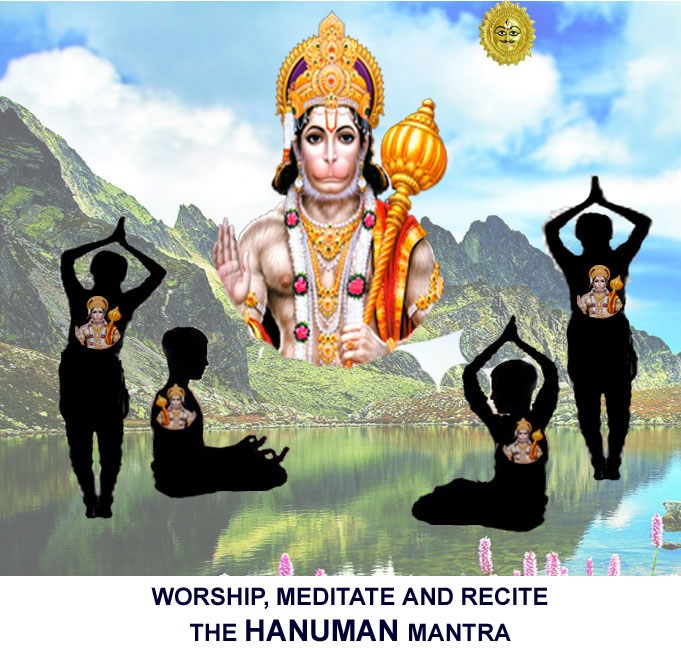
![]()

Click here to visit the Contents of the Part 1.
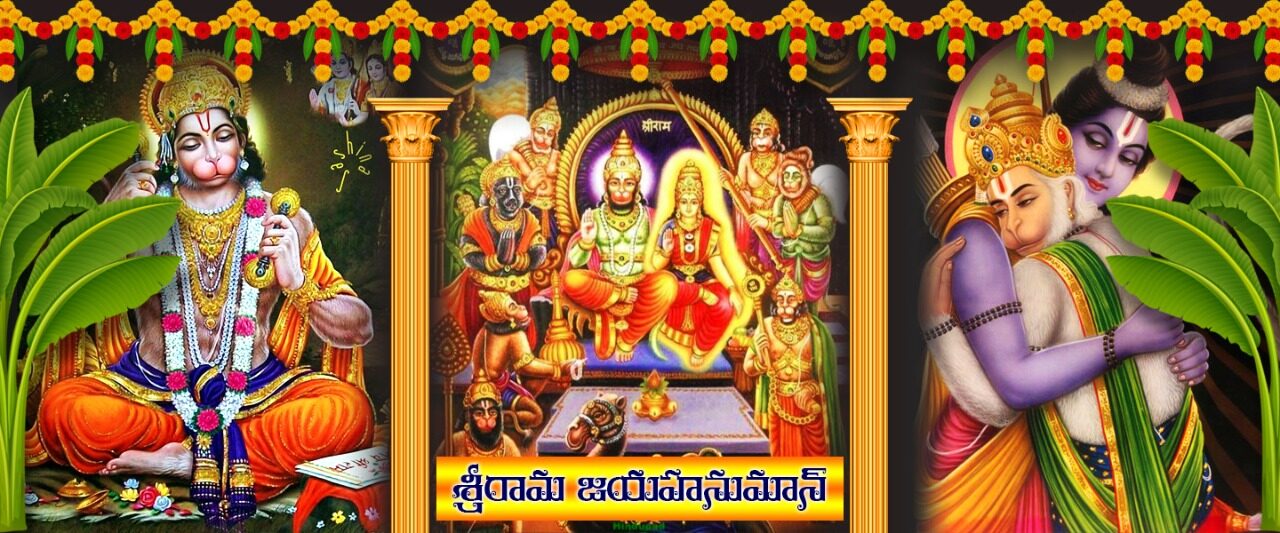
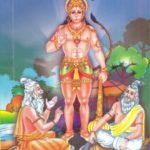

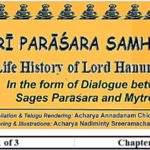



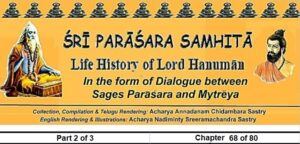
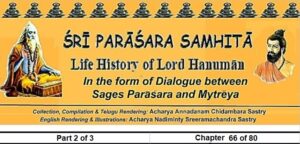
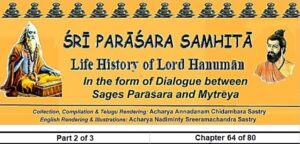
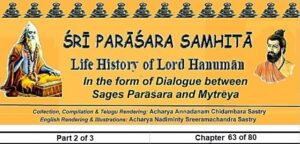
Be First to Comment